O tamanho da fonte desempenha um papel importante para tornar o conteúdo do seu site claro, legível e visualmente atraente.
Se estiver administrando um blog, uma loja de comércio eletrônico ou um site de negócios, saber como ajustar os tamanhos das fontes no WordPress permite personalizar o design para corresponder à sua marca e melhorar a experiência do usuário.
Na WPBeginner, escrevemos artigos em WordPress há mais de uma década. Durante esse tempo, sempre priorizamos tornar nosso conteúdo legível e acessível ao nosso público. Isso inclui selecionar um tamanho de fonte que seja fácil de ler e, ao mesmo tempo, tenha uma aparência limpa e visualmente atraente.
Neste artigo, mostraremos como alterar facilmente o tamanho da fonte em publicações e temas do WordPress.
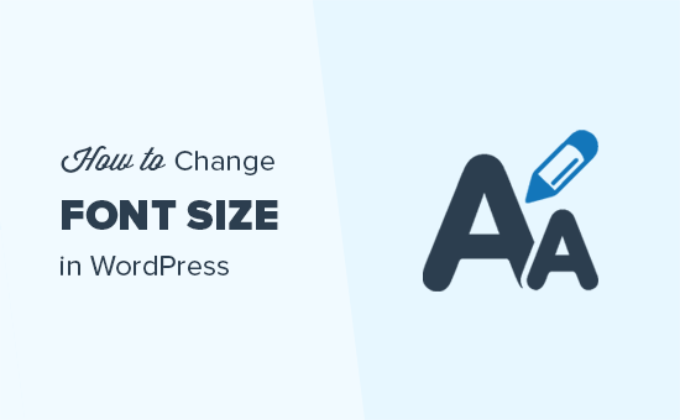
Por que alterar o tamanho da fonte no WordPress?
Ao alterar o tamanho da fonte no seu site WordPress, você pode melhorar a legibilidade do conteúdo e facilitar a leitura pelos usuários.
Além disso, aumentar o tamanho da fonte pode ajudá-lo a destacar informações importantes em seu blog do WordPress.
Por exemplo, se estiver exibindo um produto de afiliado em seu site, aumentar o tamanho da fonte pode ajudar a tornar o produto mais visível. Isso também pode tornar o conteúdo mais legível para os visualizadores que acessam o site por meio de dispositivos móveis.
Dito isso, vamos ver como alterar facilmente o tamanho da fonte no WordPress.
Para este tutorial, discutiremos vários métodos, portanto, você pode usar os links abaixo para ir para o método de sua escolha:
- Method 1: How to Change the Font Size Using Headings
- Method 2: Change the Font Size of Text in the Block Editor
- Method 3: Change Font Size Using a Plugin
- Method 4: Change Site-Wide Font Size Using Full Site Editor
- Method 5: Change Site-Wide Font Size Using WPCode
- Bonus: Change Text Color in WordPress
- Video Tutorial
Método 1: Como alterar o tamanho da fonte usando cabeçalhos
Se estiver procurando uma maneira fácil de alterar o tamanho da fonte usando cabeçalhos, este método é para você.
Usar títulos em seu conteúdo é uma ótima maneira de chamar a atenção do usuário com uma fonte de tamanho maior.
Na maioria dos temas do WordPress, os títulos têm uma fonte maior do que o texto normal do corpo, o que permite dividir seus posts e páginas em seções.
Os títulos também são ótimos para melhorar o SEO do site, pois os mecanismos de pesquisa dão mais peso aos títulos adequados do que ao texto normal do parágrafo.
Como adicionar um título no editor de blocos padrão do WordPress
Primeiro, você precisa abrir um novo post ou página no editor de blocos do WordPress.
Quando estiver lá, clique no botão “Add Block” (+) no canto superior esquerdo da tela para abrir o menu de blocos.
A partir daí, você deve localizar e adicionar o bloco Heading à página/post.
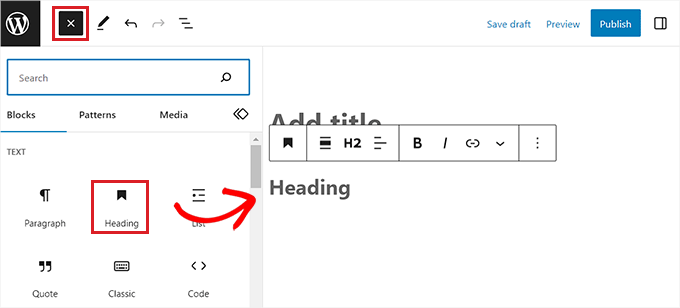
Por padrão, o bloco será definido como Título 2.
Se estiver adicionando um subtítulo, faz sentido usar a opção “Título 2”.
No entanto, se você quiser alterar isso, basta clicar no menu suspenso “H2” para selecionar um tamanho diferente.
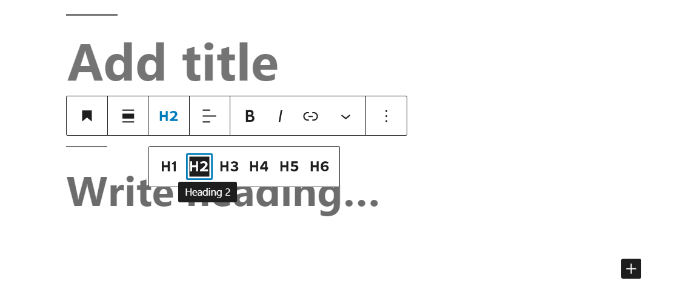
Como alternativa, você também pode alterar o tamanho do cabeçalho usando as configurações de bloco na barra de ferramentas à direita da tela.
Você pode até mesmo personalizar a cor do título, a aparência, as letras maiúsculas e minúsculas e muito mais.
Quando terminar, não se esqueça de clicar no botão “Update” (Atualizar) ou “Publish” (Publicar) para armazenar suas configurações.
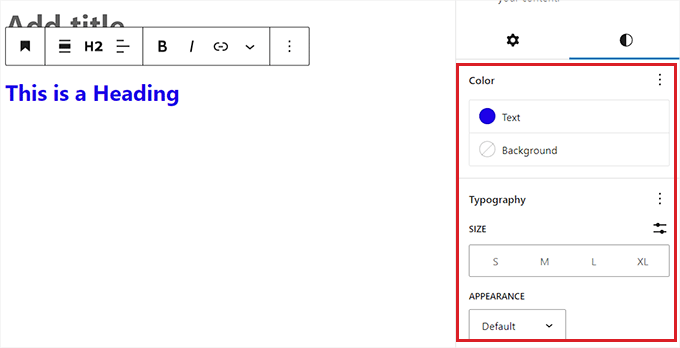
Como adicionar um título no antigo editor clássico
Se você ainda estiver usando o antigo editor clássico do WordPress, poderá adicionar títulos usando o menu suspenso Parágrafo.
Primeiro, selecione o texto que deseja transformar em um título usando o mouse.
Em seguida, clique no menu suspenso “Parágrafo” no canto superior esquerdo e selecione o tamanho do título. Agora você alterou com êxito o tamanho da fonte para um título.
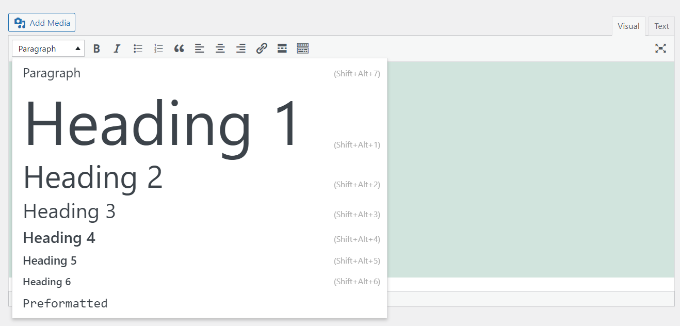
No entanto, lembre-se de que o editor clássico não permite que você altere os tamanhos e as cores das fontes dos diferentes estilos de título.
Se quiser fazer isso, você precisará fazer alterações na folha de estilo do tema (style.css).
Por fim, basta clicar no botão “Atualizar” ou “Publicar” para salvar suas alterações.
Método 2: Alterar o tamanho da fonte do texto no Block Editor
Se você quiser alterar o tamanho padrão da fonte do texto no bloco Parágrafo, este método é para você.
Primeiro, você precisa abrir uma página/post existente no editor do Gutenberg.
Quando estiver lá, clique em qualquer bloco de parágrafo e, em seguida, alterne para a guia “Styles” (Estilos) no painel de blocos no lado direito da tela.
A partir daí, você deve escolher um tamanho de fonte na seção “Typography” (Tipografia).

Você pode selecionar a opção Small, Medium, Large ou Extra Large de acordo com suas necessidades.
Se quiser alterar o texto de volta para o tamanho original, você também pode fazer isso clicando no menu de três pontos ao lado das configurações de tipografia.
Isso abrirá um novo menu suspenso no qual você deverá clicar na opção “Reset”.
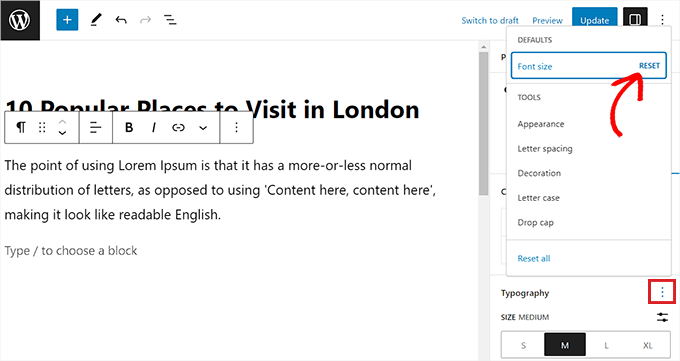
Além disso, você também pode adicionar letras maiúsculas, letras maiúsculas, espaçamento, aparência e muito mais usando o mesmo menu suspenso.
Depois disso, basta clicar no botão “Atualizar” ou “Publicar” para armazenar suas alterações.
Lembre-se de que essas opções não estão disponíveis no editor clássico mais antigo do WordPress. Se você quiser usá-las, considere fazer a mudança.
Método 3: Alterar o tamanho da fonte usando um plug-in
Se você quiser alterar o tamanho da fonte usando um plug-in, poderá usar esse método.
Primeiro, você precisa instalar e ativar o plug-in Advanced Editor Tools. Para obter instruções detalhadas, consulte nosso guia para iniciantes sobre como instalar um plug-in do WordPress.
Após a ativação, o plug-in oferece mais controle sobre os tamanhos das fontes e a formatação do texto, além de uma série de outros recursos. Ele adiciona um novo bloco “Parágrafo clássico” que tem todos os recursos de formatação de sua escolha.
Após a ativação, vá para a página Configurações ” Ferramentas avançadas do editor na barra lateral do administrador do WordPress.
Uma vez lá, você pode arrastar e soltar facilmente os recursos de formatação da seção “Botões não utilizados” para o bloco “Parágrafo clássico”.
Esses recursos incluem tamanho da fonte, família da fonte, cópia, subscrito, emoticons, código-fonte e muito mais.
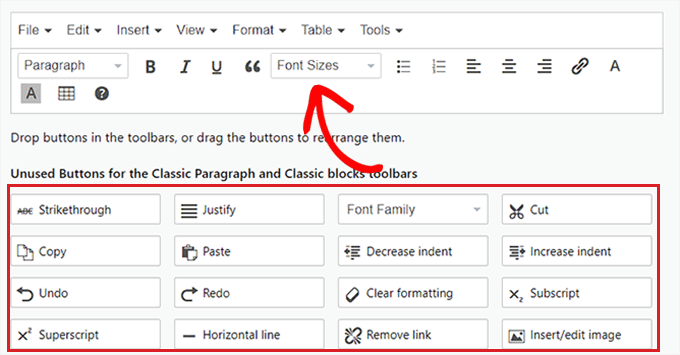
Depois de fazer isso, role para baixo até a seção “Options” (Opções) e marque a opção “Font Sizes” (Tamanhos de fonte) para acessar um número maior de tamanhos de fonte.
Depois disso, basta clicar no botão “Save Changes” (Salvar alterações) para armazenar suas configurações.
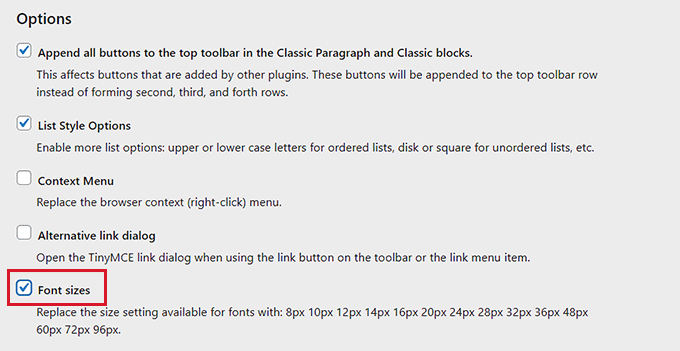
Se estiver usando o plug-in com o editor clássico, será necessário alternar para a guia “Editor clássico” na parte superior da página.
Quando estiver lá, você precisará executar as mesmas ações que no editor de blocos.
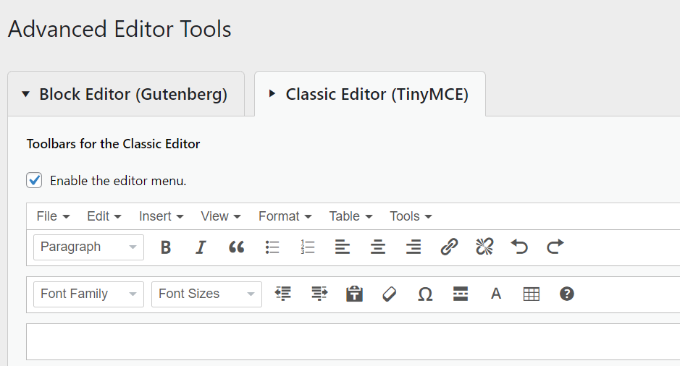
Certifique-se de clicar no botão “Salvar alterações” depois de fazer suas alterações.
Agora, para ver o plug-in em ação, você deve abrir uma página/post novo ou existente no painel do WordPress.
Quando estiver lá, clique no botão “Add Block” (+) no canto superior esquerdo da tela para abrir o menu de blocos.
A partir daí, localize e adicione o bloco Parágrafo clássico à página.
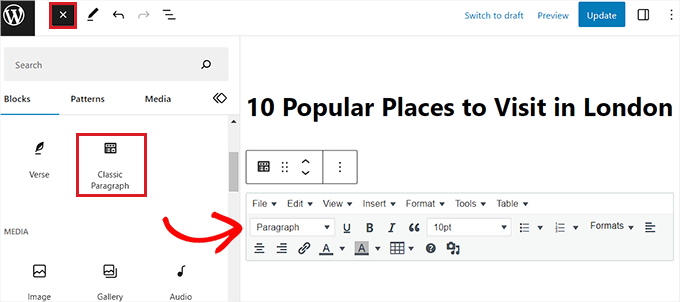
Agora você pode usar o menu suspenso “Font Sizes” (Tamanhos de fonte) para alterar o tamanho do texto no bloco “Classic Paragraph” (Parágrafo clássico).
Por fim, clique em “Atualizar” ou “Publicar” para salvar suas configurações de postagem ou página.
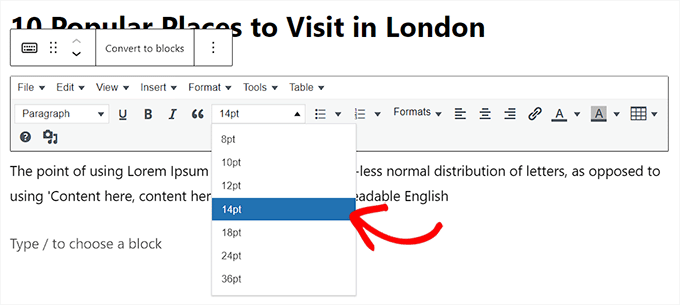
Método 4: Alterar o tamanho da fonte em todo o site usando o Full Site Editor
Se estiver usando um tema de bloco, esse método é para você. A maioria dos temas de blocos vem com um recurso de estilos globais incorporado, que permite controlar os tamanhos da tipografia em todo o site sem qualquer codificação.
Para isso, acesse a página Appearance ” Editor no painel do WordPress e clique no ícone “Styles” (Estilos) no canto superior direito. Isso abrirá um novo painel, no qual você deverá selecionar a opção “Typography” (Tipografia).
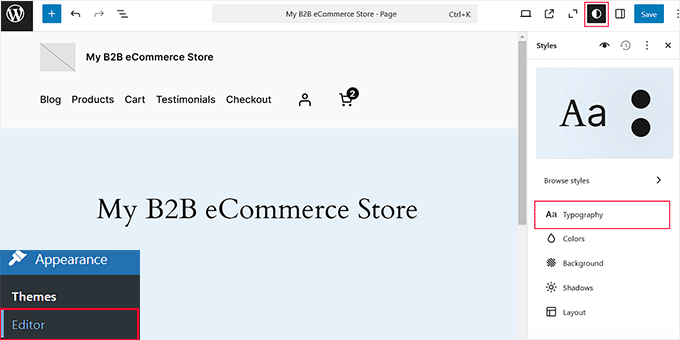
Quando algumas novas configurações aparecerem na barra lateral, você poderá alterar facilmente o tipo de fonte de todo o site na seção “Font” (Fonte).
Depois disso, role para baixo até a seção “Elements” (Elementos) e escolha a guia “Text” (Texto).
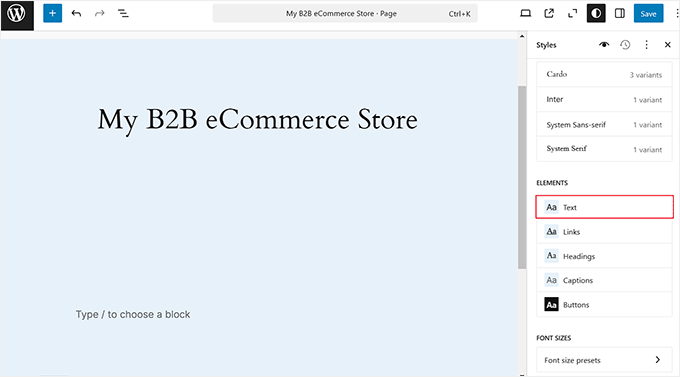
Agora você pode alterar o tamanho da fonte, o tipo e o espaçamento de todo o texto em todo o site.
Quando terminar, volte à seção “Elements” (Elementos) para alterar o tamanho da fonte de todos os cabeçalhos, links, legendas e botões.
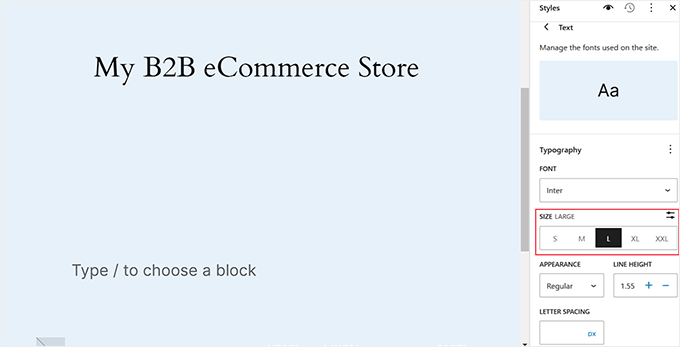
Se ainda não estiver satisfeito, você poderá alterar completamente as predefinições de tamanho de fonte do seu site.
Essas predefinições definem tamanhos padrão para diferentes opções de texto, como pequeno, médio e grande. Por exemplo, quando você escolhe “pequeno” como o tamanho da fonte em qualquer lugar do seu site, ele pode ser automaticamente definido como 0,9 rem.
No entanto, você pode personalizar a predefinição para que “pequeno” signifique 1 rem. Isso lhe dá a flexibilidade de ajustar os tamanhos das fontes de acordo com suas preferências.
Para isso, basta clicar na opção “Font size presets” (Predefinições de tamanho de fonte) na parte inferior.
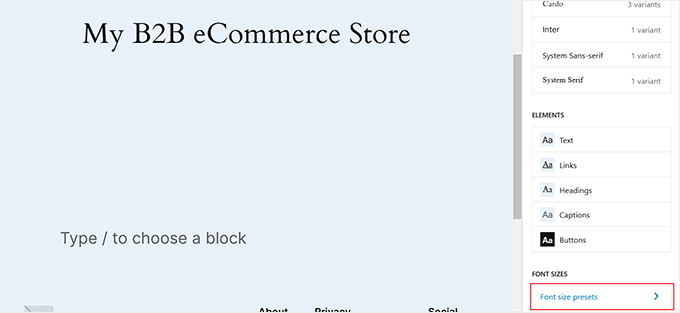
Quando a nova tela for aberta, você poderá editar facilmente as predefinições de tamanhos de fonte em todo o site.
Por fim, clique no botão “Salvar” para armazenar suas configurações. Agora você alterou com êxito o tamanho da fonte em todo o site usando o editor de site completo.
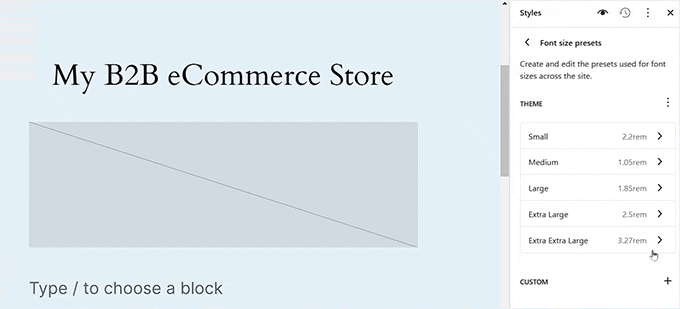
Método 5: Alterar o tamanho da fonte em todo o site usando o WPCode
Esse método é indicado se você quiser alterar o tamanho da fonte em todo o site, mas não estiver usando um tema de bloco.
Você pode adicionar facilmente essa funcionalidade inserindo código CSS em seu site usando o WPCode.
É o melhor plugin de snippet de código para WordPress do mercado, que torna muito fácil e seguro adicionar código ao seu site.
Primeiro, você precisa instalar e ativar o plug-in WPCode. Para obter instruções detalhadas, consulte nosso guia passo a passo sobre como instalar um plug-in do WordPress.
Observação: o WPCode tem um plano gratuito que você pode usar para o tutorial. No entanto, o upgrade para a versão profissional lhe dará acesso a mais recursos, como lógica condicional, uma biblioteca em nuvem de trechos de código e muito mais.
Após a ativação, vá até a página Code Snippets ” + Add Snippet na barra lateral do administrador do WordPress.
Uma vez lá, clique no botão “+ Add Custom Snippet” na opção “Add Your Custom Code (New Snippet)”.
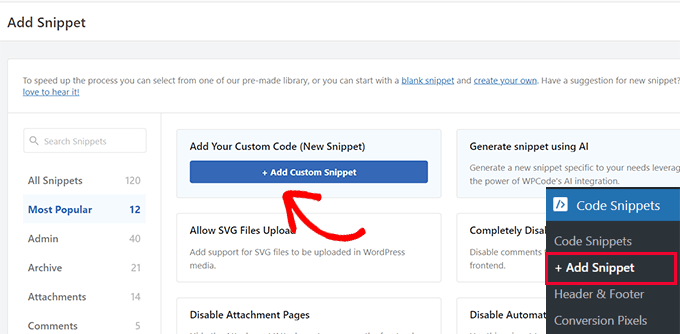
Em seguida, selecione “CSS Snippet” como o tipo de código na lista de opções que aparece na tela.
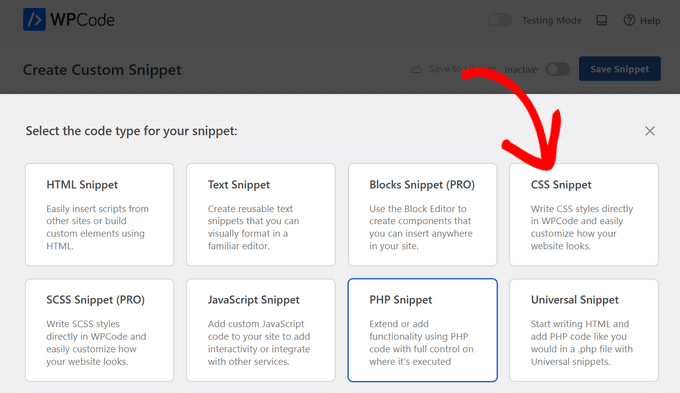
Isso o levará à página “Create Custom Snippet” (Criar snippet personalizado), onde você pode começar dando um título ao snippet de código.
Por exemplo, usamos o título “Change Font Size Site Wide” (Alterar tamanho da fonte em todo o site).
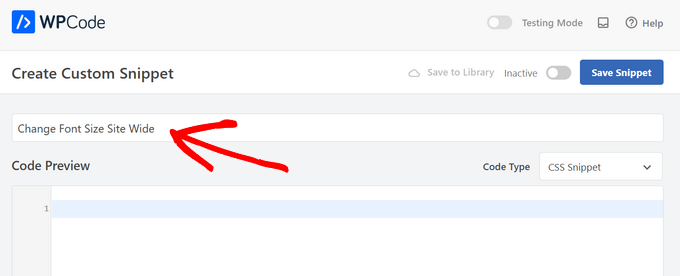
Em seguida, copie e cole o seguinte código CSS personalizado na caixa “Code Preview” (Visualização de código):
1 2 3 | p {font-size:16px;} |
Depois de fazer isso, basta adicionar o tamanho de texto desejado ao lado da linha “font-size” no código CSS.
Ele deve ter a seguinte aparência.
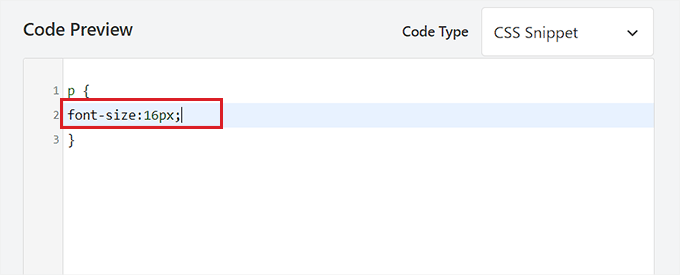
Depois disso, role para baixo até a seção “Insertion” (Inserção) e escolha o modo “Auto Insert” (Inserção automática).
Seu código será executado automaticamente em seu site após a ativação.

Por fim, role de volta para a parte superior da página e alterne o botão “Inativo” para “Ativo”.
Depois disso, clique no botão “Save Snippet” para executar seu código.
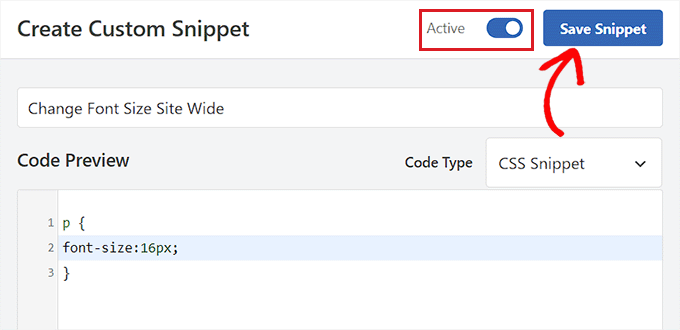
Agora você alterou com êxito o tamanho da fonte em seu site WordPress.
Bônus: Alterar a cor do texto no WordPress
Além do tamanho, talvez você também queira alterar a cor do texto em seu site para tornar o conteúdo mais legível e visualmente atraente. Isso também pode aprimorar sua marca e ajudar a destacar informações importantes.
Para alterar a cor do texto, você deve abrir uma postagem de blog no editor de blocos e escolher um bloco de parágrafo. Depois de fazer isso, vá para a guia “Styles” (Estilos) no painel de blocos e clique na opção “Text” (Texto).
Isso abrirá a ferramenta de seleção de cores, onde você poderá selecionar uma cor de texto de sua preferência para o conteúdo.
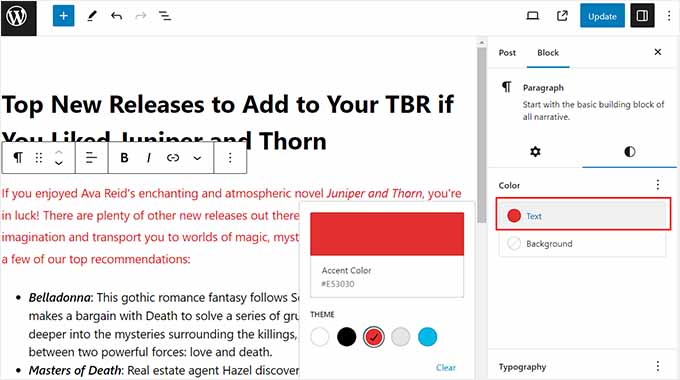
Se você quiser alterar as cores do texto em todo o site, poderá usar o WPCode, que é o melhor plug-in de snippet de código do WordPress no mercado.
Após a ativação, basta acessar a página Code Snippets ” + Add Snippet na barra lateral de administração do WordPress e clicar em ‘Use Snippet’ na opção ‘Add Your Custom Code’.
Isso o levará à página “Create Custom Snippet” (Criar snippet personalizado), onde você deve selecionar “CSS Snippet” como o tipo de código e, em seguida, copiar e colar o seguinte código na caixa “Code Preview” (Visualização de código):
1 | p { color:#990000; } |
Se você quiser usar uma cor diferente para os cabeçalhos do seu site, precisará usar os seletores h1, h2, h3 ou similares.
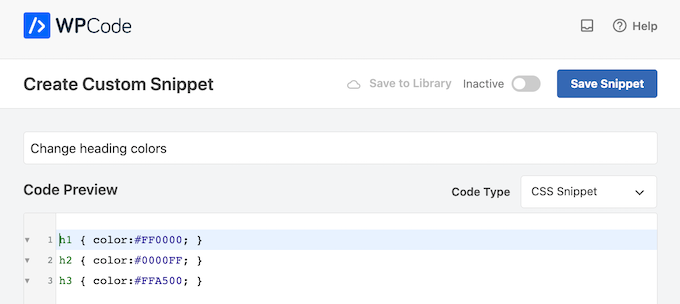
Por fim, clique no botão “Save Snippet” (Salvar snippet) e alterne a opção “Inactive” (Inativo) para “Active” (Ativo).
Agora você alterou com êxito a cor do texto em todo o seu site. Para obter instruções detalhadas, consulte nosso tutorial sobre como alterar a cor do texto no WordPress.
Tutorial em vídeo
Se você não gosta de instruções escritas, pode assistir ao nosso vídeo:
Esperamos que este artigo tenha ajudado você a aprender como alterar facilmente o tamanho da fonte no WordPress. Talvez você também queira ver nosso guia sobre como usar fontes personalizadas no WordPress ou nosso tutorial sobre como desativar o Google Fonts em seu site WordPress.
Se você gostou deste artigo, inscreva-se em nosso canal do YouTube para receber tutoriais em vídeo sobre o WordPress. Você também pode nos encontrar no Twitter e no Facebook.





Joseph
The TinyMCE really worked! Thanks alot☺
mate wierdl
How about changing font size in comments to blog posts?
Naomi
Thanks for the TinyMCE plugin suggestion for this. Super simple and it works great. I appreciate it!
WPBeginner Support
Hey Naomi,
Glad you found it useful
You may also want to subscribe to our YouTube Channel for WordPress video tutorials.
Admin
Abhisehkd
really helpful. my site is also suffering from low font size . is there is any way to solve this through style.css
Aslam Fawad
Thanks. Nice Post..
Judy
I too, would like to learn how to change font size in the style sheet.
J
Thank GOD I found this article!
Keivon
OMG. You are wonderful. That plugin is so simple and exactly what I needed. Thanks
Henderson
Thanks for this very helpful post
dennis mitchell
Thanks. very helpful.
Brian Woodburn
the point to change size of font etc has gone from the face bar
ifaheem
Thanks for the help!
Jana Sheeder
Thank you very much for a great tutorial. Very soothing voice that’s clear and easy to understand, too. I appreciate you!
Susan
Unfortunately, this is only available to paid accounts. If you’re using WordPress.com, there is no Plugins tab located in the Dashboard.
“On WordPress.com, we include the most popular plugin functionality within our sites automatically. As a result, WordPress.com users won’t find a Plugins tab in the Dashboard.”
Melissa
Actually, it’s only available to WordPress.org accounts, which is not the same as a paid WordPress.com account. Anytime you see “WordPress” without a .com at the end, it’s safe to assume it’s referring to the self-hosted .org, which WPBeginner tips & tutorials are aimed at. I know it can be confusing for people who use .com, but the two really are very different animals. When looking for help, you’ll get better results if you’re sure to include “wordpress.com” in your search terms.
Jo-Anne
I have tried to download TinyMCE several times without success. When I try to open the files. everything appears to be written in Arabic (characters look like that!) Any other suggestions as I’m new to WordPress and would love to get my website up and running. Thank you!
Cinnamonblue
NO Thanks for NOT publishing my comment. I did see in another comment that I cannot use TinyMCE or plug ins on WordPress.org.
I’m still not sure about paragraph headings, though. I have that button, but I didn’t seem to be able to get it to give a dropdown menu or anything.
One main reason I got frustrated with WP was that I couldn’t seem to change font size and the text of my blog always seemed too small.
Anthony
thank you so much.
i am relieved now that i have this plugin
Laura
Thank you so much for the tutorial! I was able to change the font size in my posts…. but I cannot figure out how to change the font for the widgets in my sidebar… any suggestions?
WPBeginner Support
Please see our guide on how to add custom styles to WordPress widgets.
Admin
Grace Joubarne
I sure wish someone could explain how we can change the post title font size without the change affecting the Recent Posts widget. I am using the basic Twelve Thirteen. It offers advanced Post Title font changes with a link found directly under the title. But totally useless, since any changes equally affect the Recent Posts box!
Grace Joubarne
What about changing the font size of the Title….when I try to do this, the Recent Posts in the sidebar increases in size and looks terrible. No way is offered to resolve this anywhere that I can find…and I’ve been looking for hours. But unless I reduce the title size, the default size is so large it takes up half the opening page.
Greg Smith
Are these option, including the plugin font size options not available if you host your own site or something? I did everything everybody says to do, dragging the font size button to the bar etc., and I get no option to resize fonts no matter what.
I also have no “paragraph” menu.
Thanks.
WPBeginner Staff
We have updated the article with new instructions. Hope this resolves the issue. Thanks for notifying us.
Colin
In method 2 described in this article- the font size option does not exist when you install it. It does add options (most of which already exist) but the one that nearly everybody wants is sadly absent. I guess photoshop was used for the above illustration
Pastelaso29
how can I change the font of a specific title page without affecting the title on the rest of the pages?
Casey
I installed the plug-in from the link on this page and installed and activated it. I opened the second menu with the last button on the first row but it looks the same as before I installed it. I tried deactivating and reactivating several times but the option to change the font is still not there. A new row at the top (I think it’s new, anyway) appeared with “file”, “edit”, “insert”, etc. right above what used to be the first row.
richard lee morris
Thanks! This article helped me. I was guided to the “extended” menu — by clicking the last button “Toggle Toolbar.”
Zakia H
Richard!! You just save me from pulling my hair out. I’ve been trying to figure out how to view the extended menu and had no idea I had to click the “Toggle Toolbar” button. Thank you for your comment
Sharon Seltzer
Your video was very helpful. I already found and changed the size of the one font my WordPress Theme gives me, but it’s a beginning. I will download your suggested Plugin.
Liz
AMAZING tutorial, thank you!
KevinJosephCollinson
Great short video. This helped a lot…. Thanks!!!…. Tip for others… Please make sure that when you “Go To Settings” and you see the “TinyMCE Advanced” text in the drop down Menu… Remember to configure your Toolbar with the Font Size etc otherwise you will not have it in your toolbar as the toolbar has much more options and the Font Size is not an automatic part of your new toolbar… So simple with the drag-and-drop to configure…. Thanks again for the great share and taking time to help other people!!!
juna id
I have Tinymceadvanced plugin installed in my WordPress Blog and i am using Sahifa wordpess theme but still in new post page i don’t find Font size option,
WPBeginner Staff
Please report in the plugin’s support forum and attach a screenshot of your post editor.
Andriken sonwane
hii mod ‘ update your post and add a extra line about this problem solution ‘ i had replied it on juna id comment’ i will be glad if you do it ‘ Thanks by d way !
Andriken sonwane
hii juna id ‘ dont worry i was dealing with the same problem but then after i figured out that ‘ you have to go to TinyMce Advanced plugin which is located in the Setting ‘ after activated and then drag the font size option from unsed options and drop it right in used option’ and save it ‘ that’s it
Chris
Thanks for this article. One of my biggest pains about posting on WP is resolved forever!
Dr3Tri
I have not ever seen those toolbars. I wonder if ANYONE would actually ask this question if they’d have those menus right under their noses!
—
Just found out that toolbar must be _extended_ to see those MOST usable buttons…
Craig Desmarais
I am having a weird issue. I set my main points to H2 tags and they were showing up but when I tried to switch them to H1 to make them larger they weren’t showing up. Anyone have any insight?
Briony
Hi There
I found your video really helpful. Can you insert plugins tp change font size on wordpress.com or only wordpress.org. I need to change font size under photo’s on wordpress.com.
Cheers
WPBeginner Support
You can not use plugins on WordPress.com
Admin
Cheeni
Hello,
I want to change font of my headings and other items apart from posts.
I have tried to amend css style sheet but I am lost because nothing happens and I have never used it before as well.
Please help!
Tine MCE only helps with post sizes but what about other things on website?
Thanks!
Emel
Downloaded and activated this plug-in, but as a couple of users mentioned earlier, it doesn’t include the option to change the font size. All of my options are the same as the picture you provided with the exception of the Font Size. In place of it, I have Styles. Your picture is very misleading.
Chris
How is ‘jumping to conclusions without exploring a plugin’ working for you? Please don’t be a moron when someone takes the pain of creating an entire article explaining stuff. You posted this 3 months ago and your question was answered by the admin below a comment posted 1 month prior to that.
Gurpreet
My add/edit post window does not have the entire second line of options that you have pictured in this tutorial. This means that I don’t have the paragraph tab in which to change font size. Any advice?
WPBeginner Support
The second line of buttons appears when you click on the last button in the first row, its called show/hide kitchen sink button. Clicking on it will display another row of buttons in your visual post editor.
Admin
Dr3Tri
Thanks, this was it!
Sarah
My add/edit post window does not have the entire second line of options that you have pictured in this tutorial. This means that I don’t have the paragraph tab in which to change font size. Any advice?
Sunganani
The TinyMCE Advanced plugin is just the one for my site. It is working beautifully. Thank you for this post
Tom Reber
Thank you, thank you, thank you! I appreciate the article…very helpful!
Radek
Nice tutorial. Thanks!
Balaji
Thanks for this post.
Ivor Vale
Can you adjust the spacing between paragraphs in WordPress ?
Editorial Staff
Yes, but you would have to edit the theme’s CSS.
Admin
Dominique
Don’t forget to click the “Show/Hide The Kitchen Sink” button in the visual editor to display the paragraph setting. It’s hidden by default.
Marie
Where can I find this button? My visual text editor doesn’t have a paragraph option; basically it only has the top row of options from the screen shot. Thanks!
Marie
Nevermind, I found it!
thethaiguy
You guys are great and thank you for info!
Michael
Another way is to use a theme framework like Thesis, and I suppose Genesis or Headway and the like(I use Thesis, so it’s what I’m familiar with). You have a dashboard to easily change anything you like anywhere, such as font size in specific locations.
Raja Tahir Qaiser
Can I know how to change default font size ?
Editorial Staff
You would need to edit the style.css file and change the font size on your body element.
Admin
sim
so please explain how you change the default font by changing the style.css??
Jake
How do you give the user an option to change the font size and elements (if they have bad eyesight, etc.) Here is an example: drwalisever. com. In the top right corner there are 2 buttons. It uses the Fusion theme, which is no longer developed. A tutorial would be great, thanks!
Bozga Ovidiu
i don’t like plugins
Editorial Staff
Any particular reason for that?
Admin
Ashutosh Joshi
But I think will effect in SEO, as there are no option for Heading tags are being shown.. is it so?
Editorial Staff
The heading tag options only show up in the visual editor. If you are in the HTML editor, it will not show.
Admin